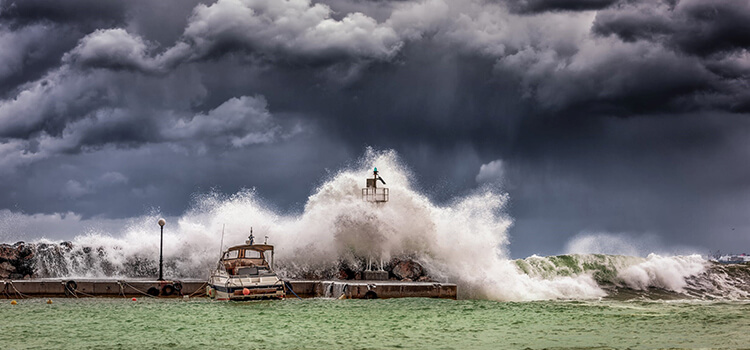South Florida is breathing a sigh of relief as Hurricane Dorian just scraped our coastline. Most of the headaches that come with a hurricane including property damage, power outages, long lines at gas stations, limited medical supplies, etc. were avoided. Yet now comes the hard work. The only way to minimize damage from future hurricanes is to plan ahead. This includes safety planning, estate planning, and financial planning. In that order.
Our 3-prong proactive approach will better prepare you for the personal storms that accompany hurricane season. First is planning for the safety of yourself, your loved ones, and your personal assets. Next, an estate plan is a crucial form of hurricane preparation because it helps you plan for what might happen if you’re incapacitated or killed in a natural disaster. Last, but not least, financial planning will help mitigate weather-related damages, as hurricanes are among the natural disasters with the greatest financial impact.
Here’s what every Florida resident needs to read, learn, and implement immediately!
Category 1 – Safety Planning
- Emergency Kit – Always have enough food, water and basic supplies to last your family for 7 days.
- Board Up Windows – Shutters are the best protection for doors and windows. Alternatively, boarding up your windows also mitigates damage.
- Evacuation Routes – Learn about, either online or through the media, all available secure evacuation routes.
- Safe Place for your Car – In case you need to evacuate, taking your car is the best option. Additionally, park your car indoors to prevent falling debris from causing damage and try to park on higher ground.
- Fuel up your Car – Ensure that your car is fueled-up ahead of time. In the event of a power outage, gas stations are going to be closed.
- Flood Water – Avoid flood water as it may be electrically charged from underground or downed power lines and may hide dangerous debris.
Category 2 – Estate Planning
- Taking Care of Minor Children – If you have minor children (under 18 years of age in Florida), you (and your spouse) must designate a guardian to physically and financially take care of your children in the event that something happens to you. This designation can be done within your Last Will and Testament or in a separate document called a “Declaration Naming Pre-Need Guardian for Minor.”
- Living Trust – Also known as a Revocable Trust, is crucial for anyone that owns real estate in their name. Even if the only real estate is your homestead property! With a properly funded Trust, upon your death, your home and any other assets in the Trust pass to your beneficiaries through the Trust, and not through the grueling court process called “probate.” Without a Trust, your family will have to hire an attorney, wait out a creditor period, spend a lot of time and expense to inherit the property, and go through a long 6-12 month waiting period. Trust us, avoid probate at all costs.
- Last Will and Testament (“Will”) – Used to designate the beneficiaries who should receive your assets upon your death. Wills allow you to appoint someone to become “Personal Representative” of your estate. This person will be responsible for carrying out your last wishes according to what you wrote in the Will.
- Sudden Incapacity – Imagine a natural disaster renders you incapacitated. Who will write checks to pay your bills, transfer monies in your bank accounts, renew your health insurance, etc.? The list of financial matters is endless. With a Durable Power of Attorney, you select an agent (ahead of time) to “step into your shoes” in case of your sudden mental or physical incapacity. The agent will be able to make legal and financial decisions and conduct transactions on your behalf. The Power of Attorney document ends when a person passes away. Note that if you created this document prior to October of 2011, it is time to update it as the laws in Florida have changed.
Category 3 – Financial Planning
- Flood-Proof Legal and Financial Documents – Your legal and financial documents are an important asset. The first step is to make electronic scans of them on the computer. Next, you should backup those electronic files in a cloud-based system, such as Dropbox or Google Drive. In case your computer crashes, the cloud will live on with your documents. For original documents you want to preserve, such as a Last Will & Testament, Trust Agreements, and other estate planning documents, store them in a water-proof plastic Ziploc bag.
- Have Electronic Access to your Financial Institutions – Setting up electronic accounts, rather than relying on the U.S. postal service, will give you instant access to your bank accounts, social security benefits, mortgage lender, credit card companies, etc. You will be able to log in and instantly see your available funds, statements, and do things like deposit a check or pay a bill.
- Keep Cash Handy – Banks and ATMs may be unavailable once a storm hits due to loss of electricity, flooding, or simply closing the branch to ensure the safety of staff and clients. Cash is king and continues to be accepted by most venues during times of emergency.
- Doublecheck your Insurance Coverage – Review the fine writing in your policy regarding home and property damage. Make sure to ask: If your home is damaged, what is your deductible? If you must live at a hotel, how much of your hotel bill will be reimbursed by the “use of loss” coverage. If your home needs repairs, are you forced to use the contractors your insurance company provides, or can you select your own repair crews?
Let’s face it, we are all human and mother nature is a mighty force to contend with. All we can do is hope for the best and prepare for the worst. Our firm can help you spot all the scary “what-ifs” that accompany a major storm. Contact OC Estate & Elder Law at (954) 251-0332 or info@ocestatelawyers.com to get started with ensuring your peace of mind. Our attorneys are fluent in English, Spanish and Russian.
















